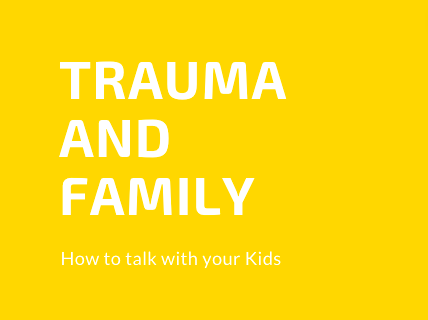1. Communication is key to undestand and process emotions.
2. Don’t be afraid to talk with your children about your feelings and about what is going on. Avoidance will not shield them but generate anxiety.
3. When kids are informed and do understand, they feel safe.
4. How to know what my kids can handle? Kids might have very complex questions and concerns. Keep in mind that they need information to process their emotions. Answer in simple terms, address their emotions and convey a sense of security to them.
5. Attentively listen to your kid without commenting. Then repeat with your words what you understood and ask them if you got the information right. Ask them how they feel about it. Name the emotions and try to empathize with them. Now talk about that feeling in contexts other than war.
6. You might feel angry or disappointed, but avoid hate speech that addresses ethic groups, heritage, nationality, religion, etc. Talk with awareness, avoid generalizing, be specific.
7. Don’t overwhelm kids with unnecessary information that they can’t handle. Remember to focus on the question they asked.
8. If you don't know an answer, just tell them you don’t know. You are only human.
9. Make sure your kids know that you are their stronghold. Maybe you feel frightened, anxious or broken but remember that you are safe now and communicate it to your children. If necessary take a few breaths and remind yourself with every exhale that you are safe now.
10. Keep your kids away from TV and media reproductions of war. Having said that, don’t exclude them. They know war is happening. Let them participate in their own way. For instance, help them find their own mission to engage or express themselves.
11. Let them share your emotions, don’t alienate them. Kids are both emotionally and cognitively intelligent. Don’t forget this.
12. Be aware of what and how you communicate in front of your kids. Adults are entitled to be emotional too, but you are their role model.
13. If you don’t feel ready, if you are too sad, if you can’t stay calm or handle such conversations, that is ok. Don’t force yourself, let your kids know that you will be addressing that topic with them in a near future. Preferably set a clear time window to do so and take the necessary time to prepare.
14. You and your Kids are worried about the people you left behind. You can’t ignore the feeling of absence but remember that presence is not solely physical. Don’t hesitate communicating with the absent family members. If direct communication is not possible, you can record voice/video messages, write letters, draw, or use any creative output that comes to your mind.
15. Focus on your resources, you and your kids are more than what you left behind. What makes you special?, what smells do you like?, what emotions have enriched your life?, what good memories accompany you? what makes you strong?, who and what are you proud about? what has helped you overcome the most difficult episodes of your life? what flavour makes you feel happy? Everyone is unique and special, so are you, so are your kids. Keep that in mind.
16. You can make a list of your resources and carry it with you, wherever you go. And when you feel overwhelmed, take your list out of your pocket and read it. Remember and internalize your own words, your own resources are always with you. For kids you can make color bracelets in which each color represents a resource or a message. These are visual inputs that will help them connect emotions with positive experiences.
17. When you feel that anxiety is overcomming you and your kids, you can hug each other, repeating aloud that you are safe and you are alive. Remember, you and your kids are safe and healthy. You managed to bring you to safety and you are in a safe place.
18. You are in a process of transition with many changes. You will probably move from one place to the other, change schools, etc. Give you kids time and space to say “hello” and “good bye” empathize with them by letting them know you can feel with them, .
19. Communicate new plans and changes to your kids before they take place. Kids can process and handle information, their brain plasticity is designed to do so. But both, you and them, need time to digest your emotions. Give them that space and time.
20. If you feel you can't handle any of this, look for professional help. Trauma can interfere with your mental and physical health. Seeking for help on due time will help you cope with it and can avoid severe repercussions.
Call-to-Action
Please help us help more people, you can help us advocate to acknowledge Mental Health, take a crash multiplicator-workshop, donate to help us reach more people in need or simply by letting us know you value the work we do.
Text created by Aylin Dionmez and Heike Arzapalo
